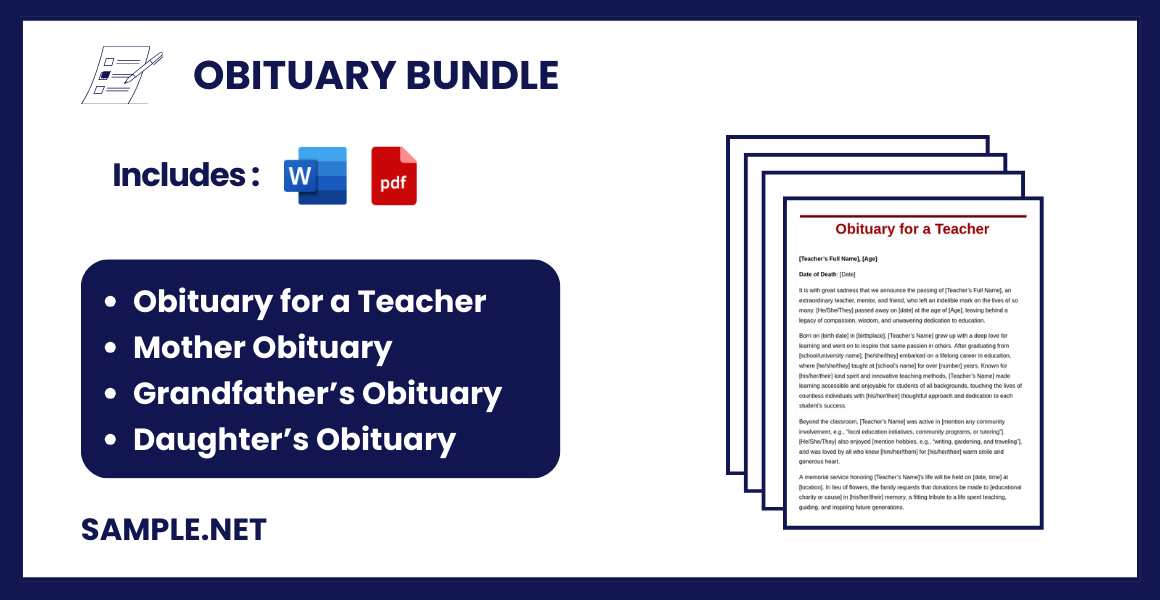
Obituary Format
[Full Name], [Age]
[City, State]
Date of Death: [Date]
It is with deep sorrow that we announce the passing of [Full Name] at the age of [Age]. [He/She/They] passed away peacefully on [date] in [location, e.g., “at home” or “at the hospital surrounded by family”].
Born on [birth date] in [birthplace], [First Name] was the beloved [relation, e.g., “son,” “daughter,” “brother”] of [Parent Names or names of key family members]. [He/She/They] grew up in [city/area] and attended [school/university]. [Briefly mention significant life events, such as marriage, career, hobbies, or community involvement, e.g., “an avid gardener and beloved member of the community, [First Name] devoted much of [his/her/their] time to volunteering at local charities and serving as a mentor to those in need.”]
[First Name] was known for [positive qualities or personality traits, e.g., “his kindness, sense of humor, and unwavering dedication to his family and friends”]. [He/She/They] will be deeply missed by [list immediate family, e.g., “wife, children, grandchildren,” or any significant survivors]. [Optional: Mention any predeceased loved ones.]
A funeral service will be held on [date, time] at [location], with [name of officiant or person conducting service, if desired]. [First Name] will be laid to rest at [cemetery/location], [optional: “in a private/family ceremony”].
In lieu of flowers, the family requests that donations be made to [charity or cause, if applicable] in [First Name’s] memory.
Obituary Samples
-
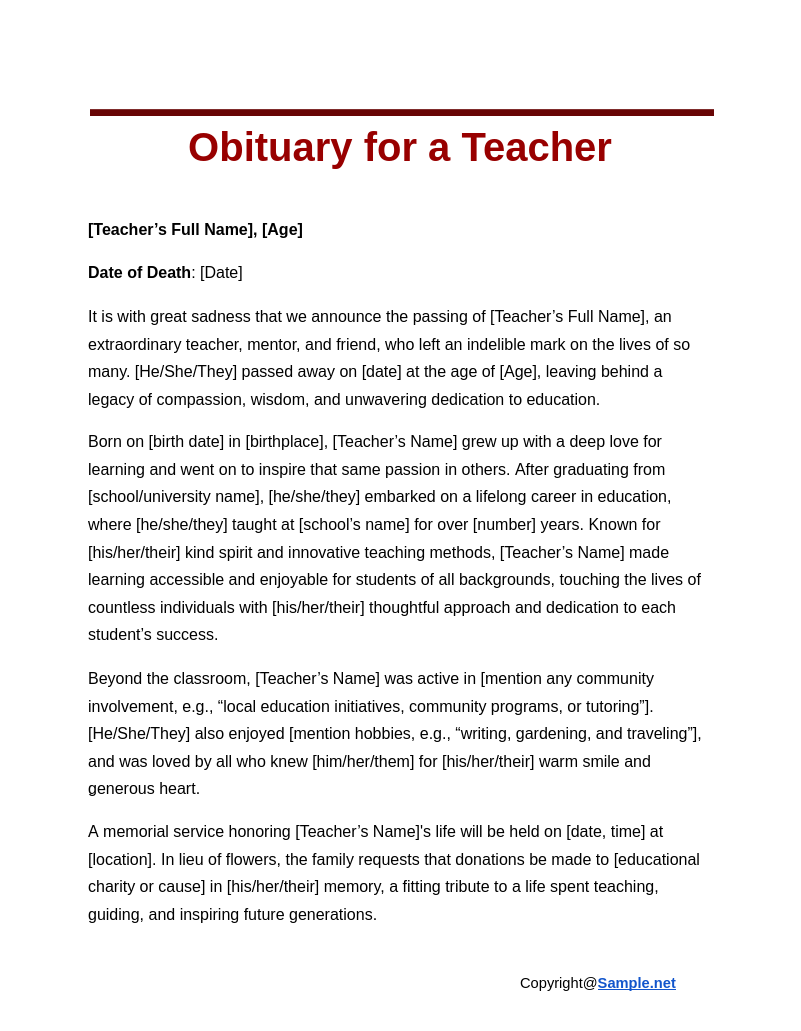
Obituary for a Teacher
download now -
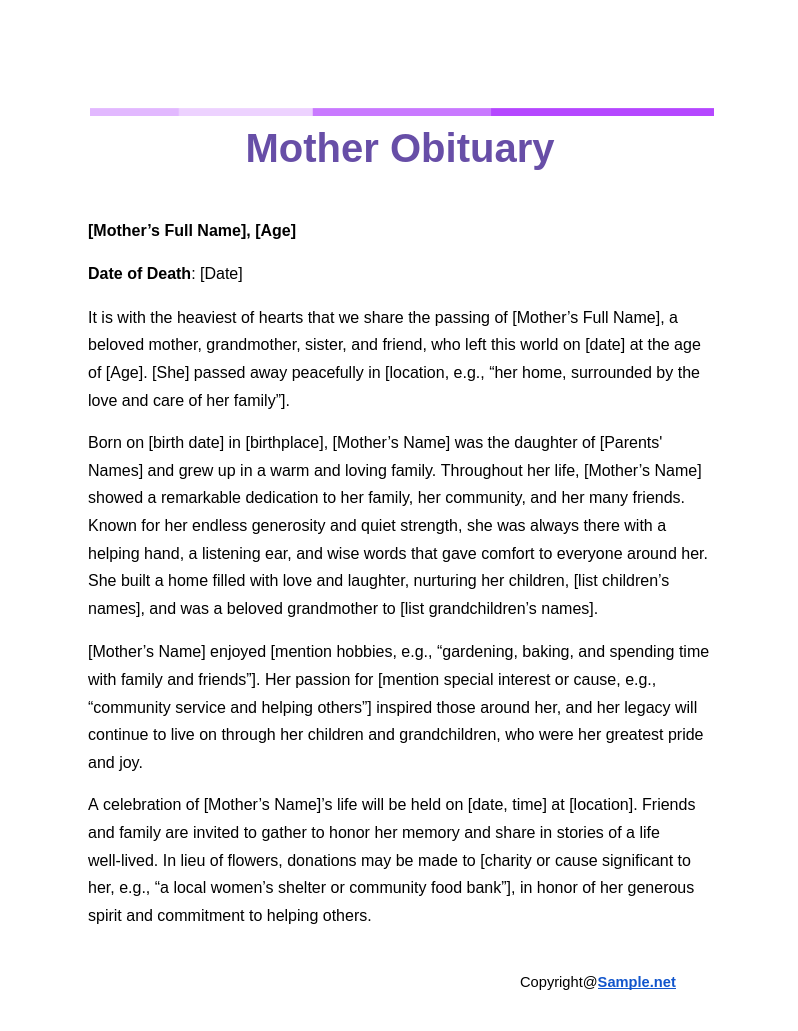
Mother Obituary
download now -
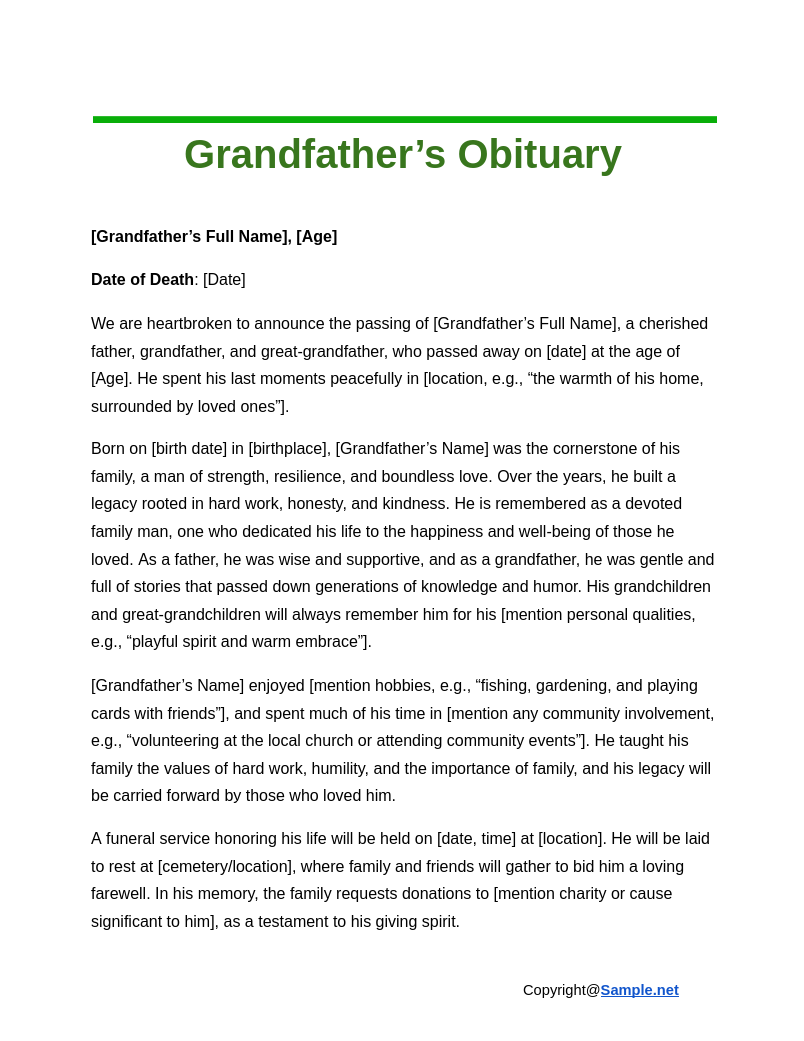
Grandfather’s Obituary
download now -
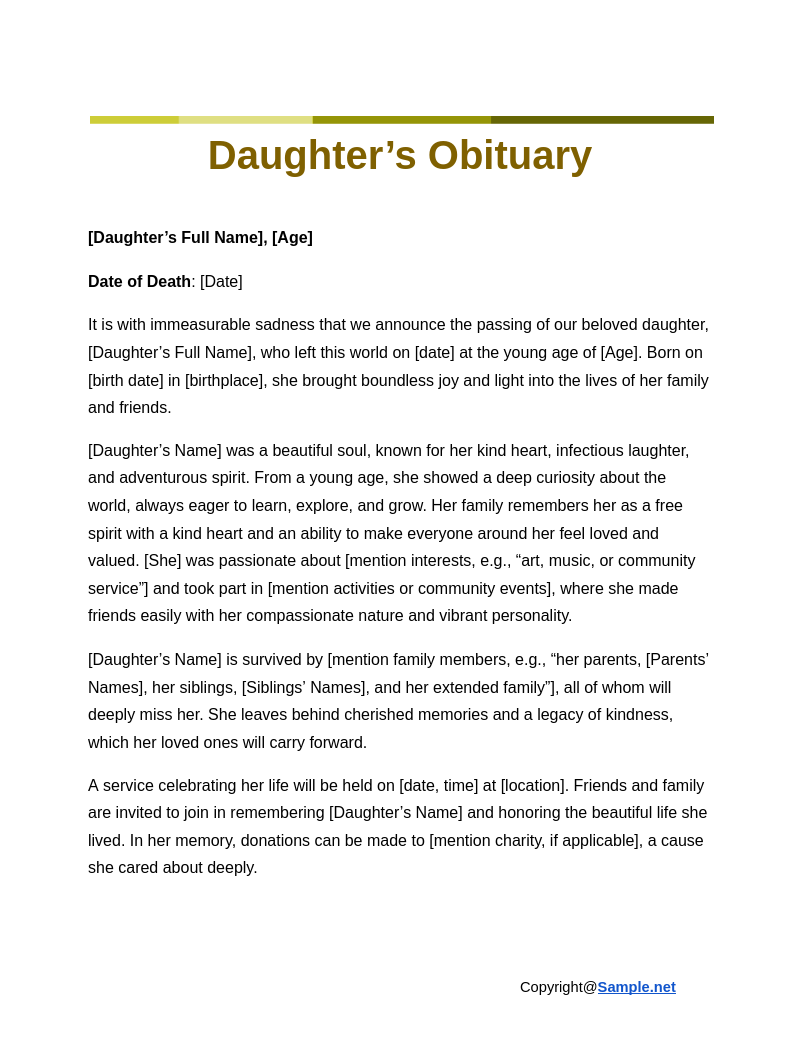
Daughter’s Obituary
download now -
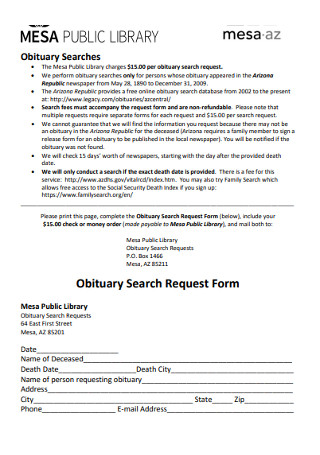
Obituary Search Request Form
download now -
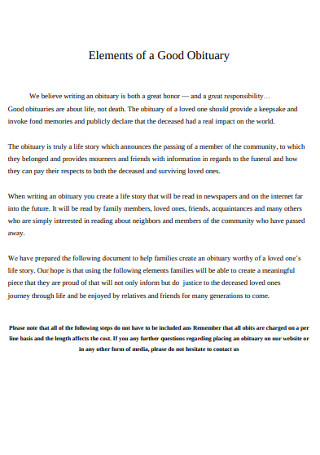
Elements of a Good Obituary
download now -
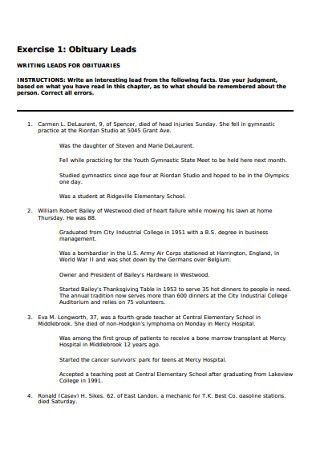
Obituary Leads Template
download now -

Conventions of Obituary Template
download now -
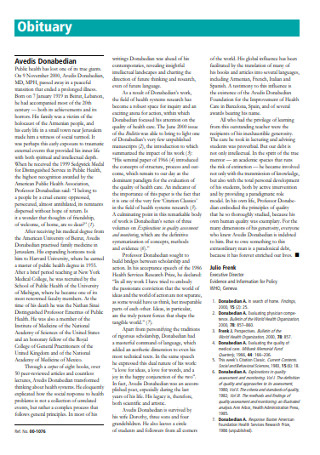
Standard Obituary Template
download now -
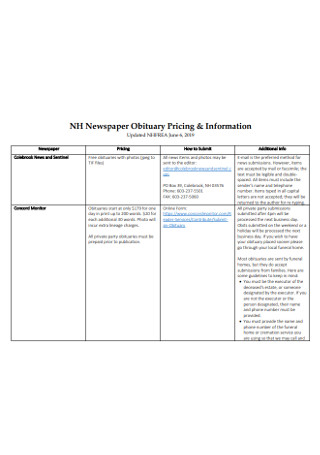
Newspaper Obituary Pricing Template
download now -
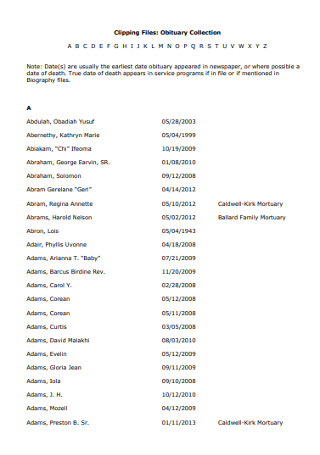
Obituary Collection Template
download now -
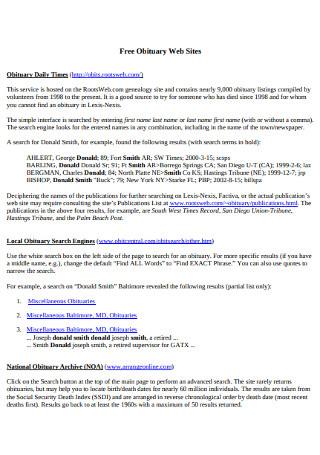
Free Obituary Web Sites
download now -
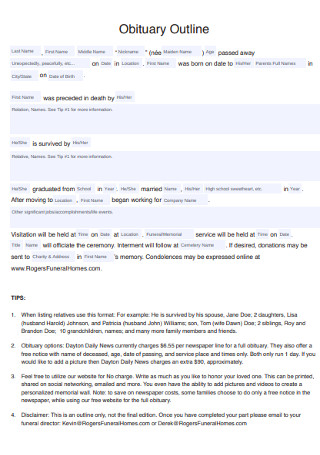
Obituary Outline Template
download now -

Obituary Request Form
download now -
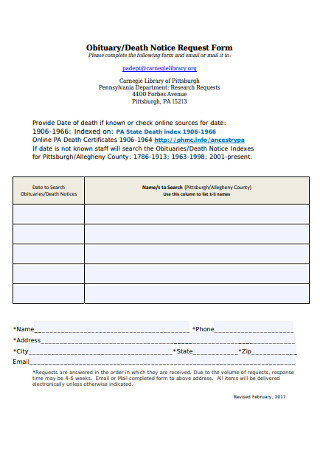
Obituary and Death Notice Request Form
download now -
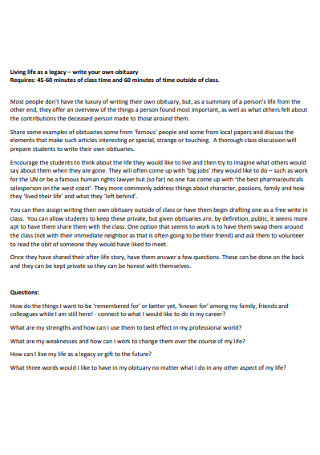
Legacy Own Obituary
download now -
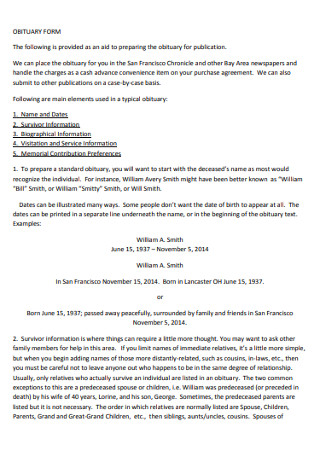
Obituary Form Template
download now -
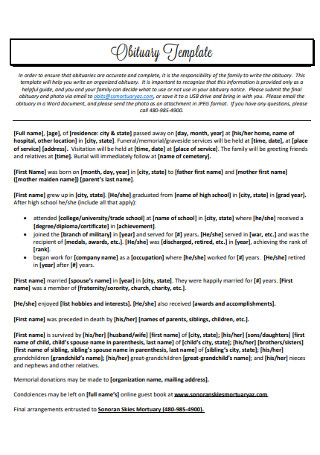
Sample Obituary Template
download now -

Obituary for Walter Neupert
download now -
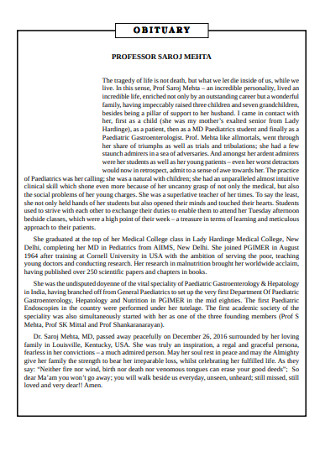
Professor Obituary Example
download now -
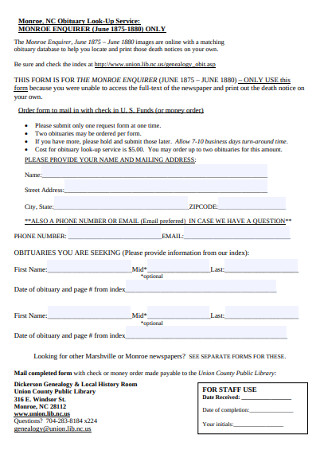
Obituary Look-Up Service Example
download now -
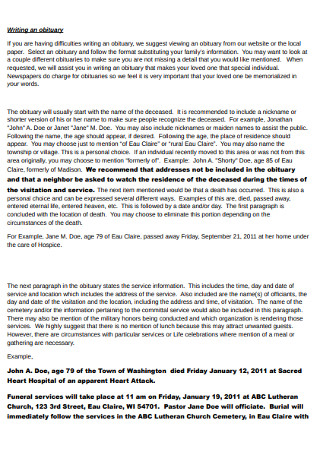
Formal Obituary Example.
download now -
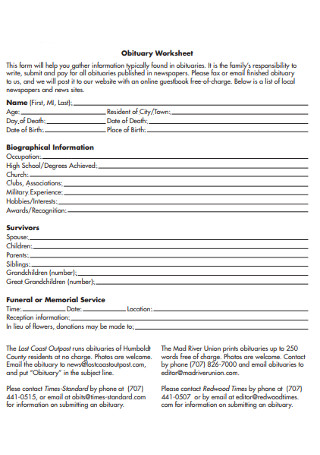
Obituary Worksheet
download now -
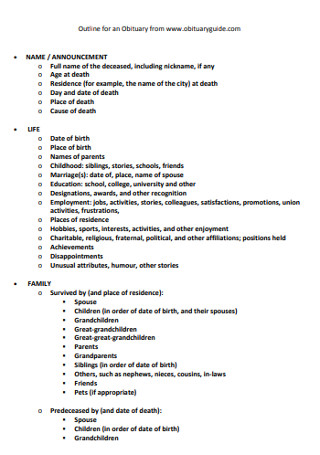
Outline for an Obituary
download now -
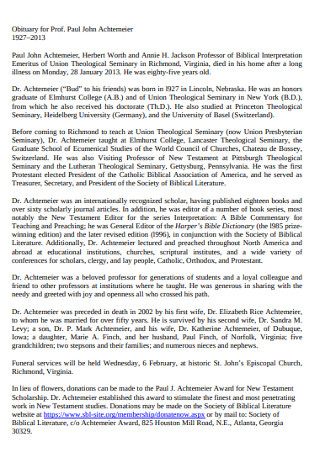
Obituary for Professor
download now -
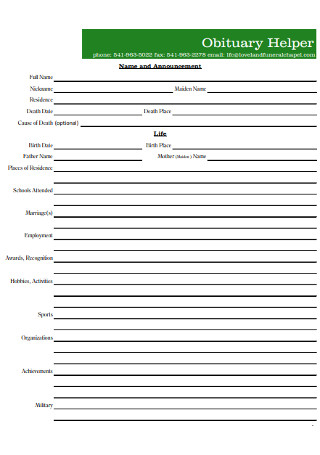
Obituary Helper Template
download now -
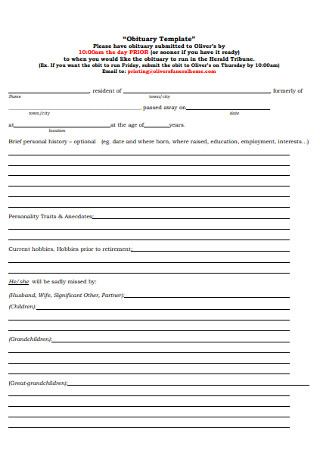
Basic Obituary Template
download now -
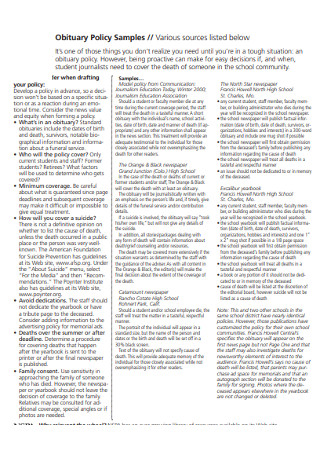
Obituary Policy Samples
download now -
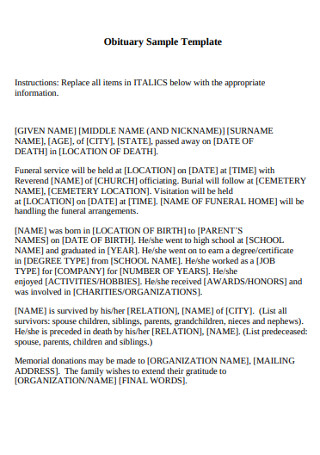
Simple Obituary Template
download now -
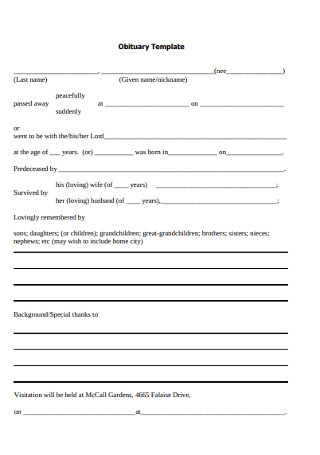
Garden Obituary Template
download now -
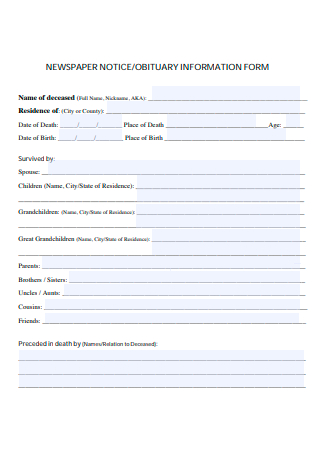
Obituary Information Form
download now -
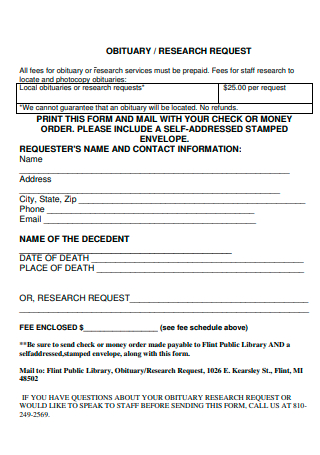
Obituary Research Request
download now -
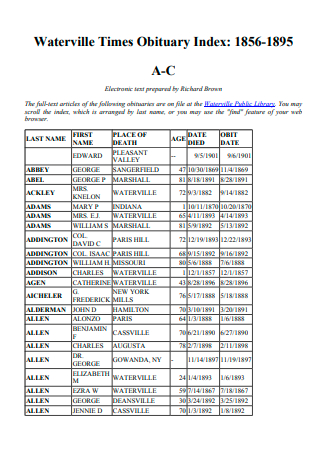
Obituary Index
download now -
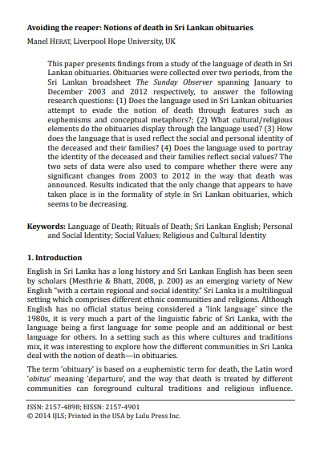
Sample Obituaries Studies
download now -
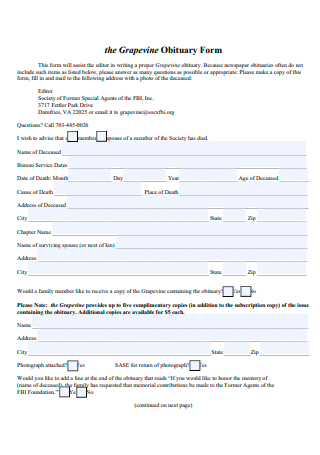
Grapevine Obituary Form
download now -
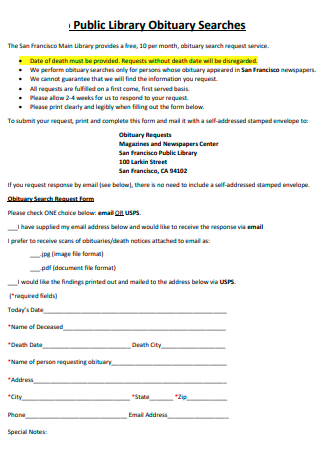
Public Library Obituary Searches
download now -
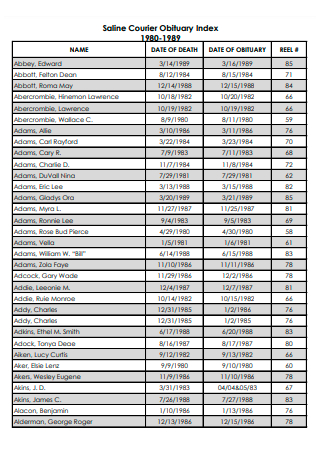
Courier Obituary Index
download now -
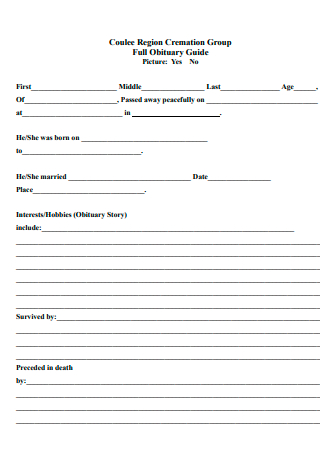
Cremation Group Full Obituary
download now -
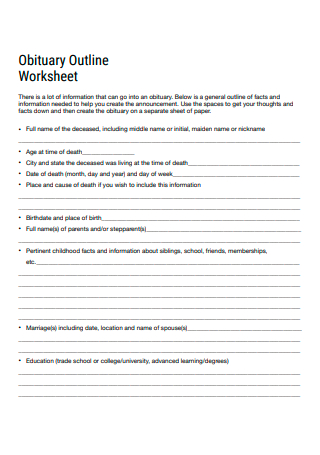
Obituary Outline Worksheet
download now -
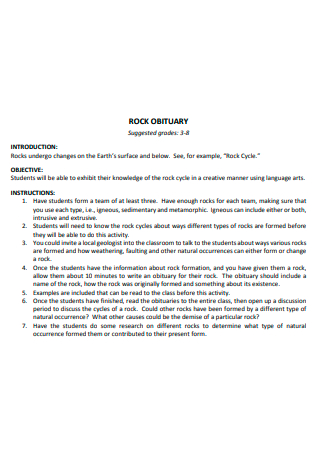
Rock Obituary
download now -
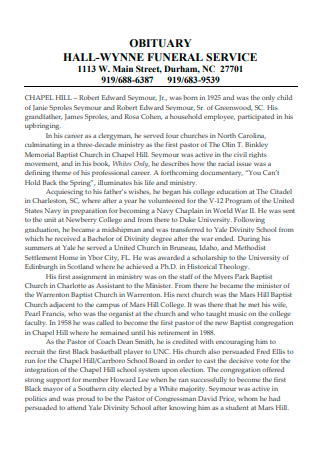
Obituary Funeral Service
download now -
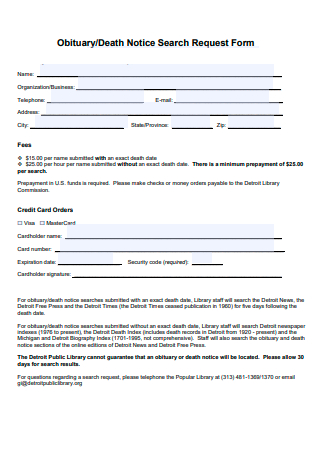
Obituary Death Notice Search Request Form
download now -
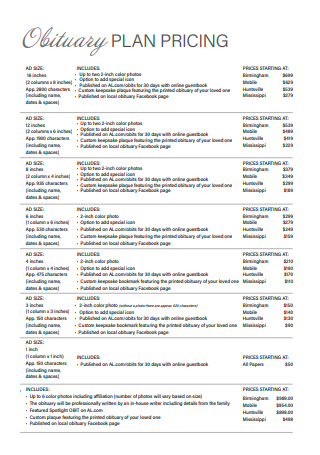
Obituary Plan Pricing
download now -
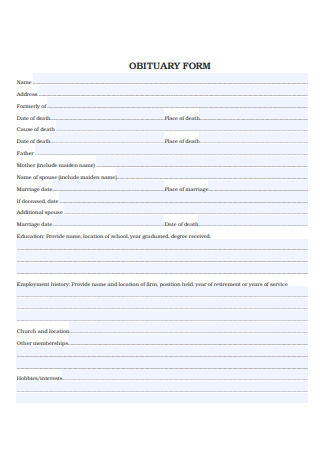
Obituary Form
download now -
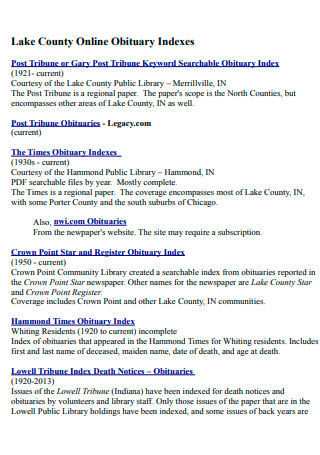
Online Obituary Indexes
download now -
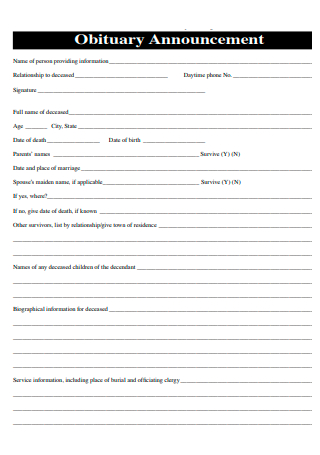
Obituary Announcement
download now -
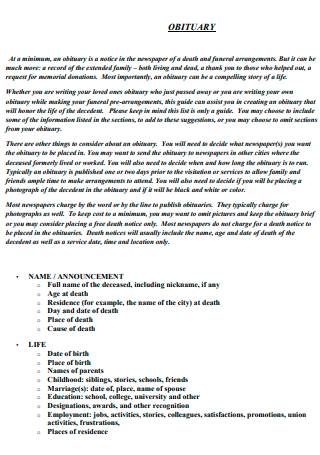
Obituary in PDF
download now -
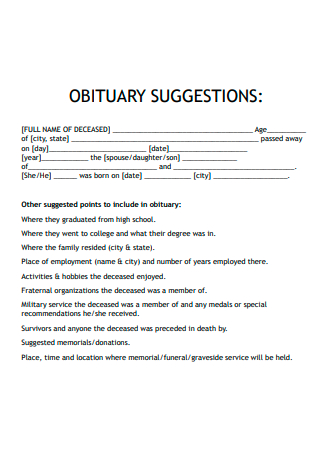
Obituary Suggestions
download now -
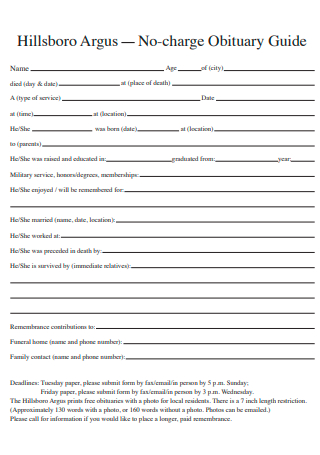
No Charge Obituary
download now -
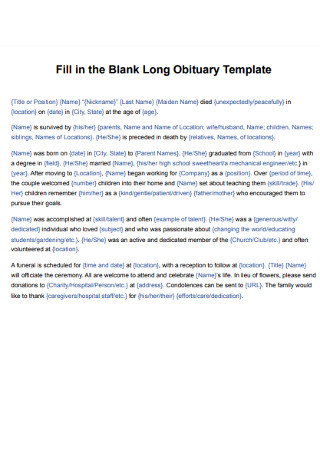
Blank Long Obituary Template
download now -
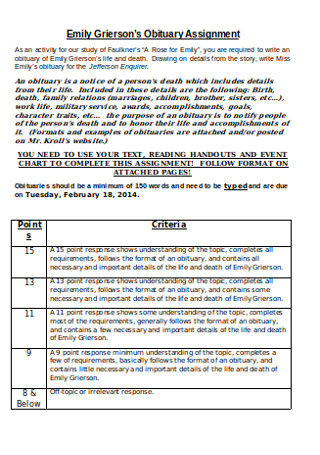
Obituary Assignment Template
download now -
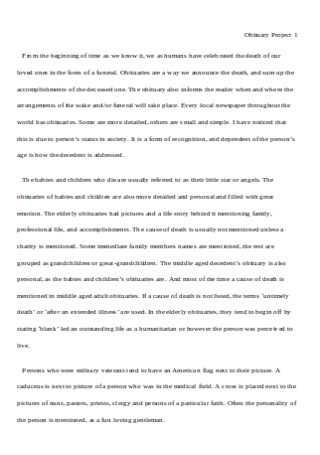
Obituary Project Template
download now -
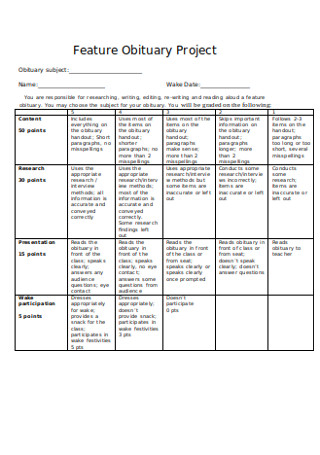
Feature Obituary Project
download now -
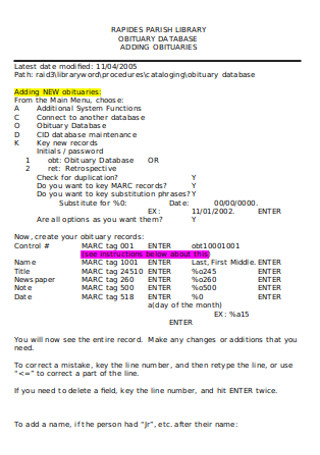
Obituary Data Base Template
download now -
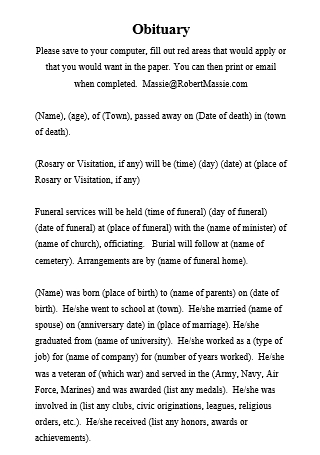
Obituary in DOC
download now
What Is an Obituary and Why Publish It?
An obituary is a written announcement of someone’s passing, usually published in newspapers, funeral programs, and online memorial pages. It’s a final farewell to a loved one that family members can keep as a memory of a life once lived. You can even say that it’s an indirect call for support as loved ones go through a difficult time in the coming days, weeks, and months. The typical obituary contains a brief description of the subject, along with details regarding their upcoming funeral service. You can also see more on Affidavit of Funeral Expenses.
Although you’re likely to find obituaries of well-known figures and personalities in larger news publications, for everyday people, it’s still common for family members and friends of the deceased to share the news themselves on social media or pay the local newspaper for page space. Obituaries aren’t a must when someone dies, but they do help celebrate a loved one by creating a public record of their life. It’s also an opportunity for you to let the wider community know about one’s passing, particularly for old friends, distant relatives, and former colleagues you are no longer in close contact with. Fortunately, social media sites and online memorial pages offer free postings for you to announce the news without spending a dime. You can also see more on Condolence Message.
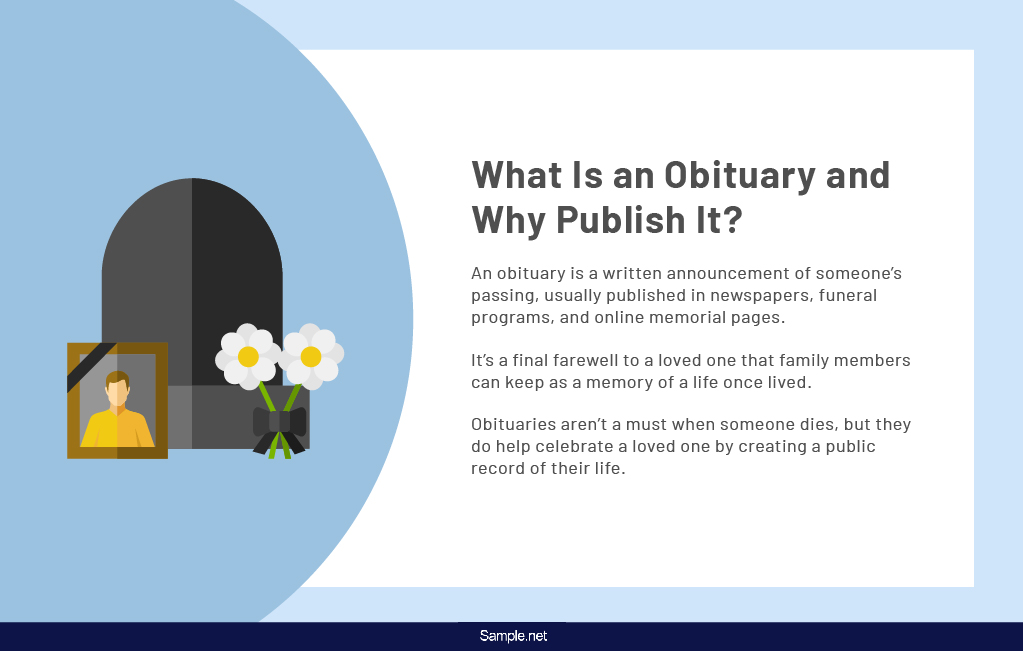
The Key Differences between an Obituary and a Death Notice
It’s easy to confuse obituaries with death notices, and vice versa.
A death notice is a paid announcement that provides brief details about one’s memorial or funeral service for visitors to pay their respects and to know where they can forward their donations. Families of the deceased can submit the notice to their chosen newspaper, whether locally or nationally. Most funeral homes offer special packages that include the immediate publication of the death notice on your local paper. You can also opt to have them write the notice on your behalf, but make sure you take the time to review the material before it ends up on print. You can also see more on Band Performance Contract.
On the contrary, an obituary is an editorial article that informs the community about a person’s death and presents biographical information about the deceased. Note that not many major newspapers publish long-form obituaries, except those of prominent or famous individuals, so it’s best to check with your local newspaper and community organizations that may include obituaries in their newsletters and publications.
Feel free to reach out to your local publishers and community groups for their pricing policies. The latter may even offer this service for free. But if it happens to go beyond your allotted budget, you can choose to post the obituary on a social media platform to save on costs. You can also see more on Death Certificates.
Why Is Good Obituary Writing Important?
When Canadian-American rocket and jet propulsion engineer, Yvonne Brill, died in 2013, The New York Times announced her passing in the most controversial way possible: an obituary introduction that spoke about anything but her contributions to the field of Science and Technology.
Instead, the news outlet began with a line that complimented her cooking with a Beef Stroganoff reference. While the Times might have thought it was a good idea to talk about who Brill was as a person—a cook, a wife, and a mother of three—it’s not exactly the best way to pay tribute to someone who received the National Medal of Technology and Innovation award from former U.S. President Barack Obama.
Although they have since changed the first statements of their obituary with something more compelling, this highly criticized mishap by the Times serves as a reminder of how we regard obituaries. You see, obituaries aren’t quite like the standard type of journalism you’ve come to know. In most instances, it’s probably the first and last time that a person’s name ever appears on paper. They elevate the status of the deceased by focusing on the positives and sharing any news worth telling. And because it helps honor the dead on a public platform, you have to be very careful not to say anything insensitive and disrespectful to the friends and family of the deceased, as well as the rest of your readers. Practicing good obituary writing should help you memorialize the person who died with the honor and respect they deserve. You can also see more on Affidavit of Death.
How Do You Write a Meaningful Obituary?
The nonprofit group, Our World in Data, reports the total number of deaths in 2017 at 56 million, with causes of death pointing to a variety of factors. While death is not something we can control or predict accurately, it is something we’re forced to accept regardless of the circumstances. You can also see more on Condolence & Sympathy Letter.
When someone dies, it becomes a touchy subject for anyone in the community to talk about. Having it in writing makes it easier for people to deliver the news of someone’s passing and giving honor to the life they lived. Generally, an obituary must consist of a specific set of information pertinent to the life and death of the deceased. And because it’s never easy to craft something that could trigger your emotions during these tough times, here are some tips on how to write an obituary to help you out. You can also see more on Consolation Letters.
1. Announce the Death
Begin the obituary with an announcement of a person’s death. It doesn’t have to be lengthy, as long as it highlights all the key details of the person who passed on, particularly their name, age, and day of passing. Adding a brief description of how loved ones remember them to be is one way to keep things personal. It’s possible to communicate this identifying statement, along with the announcement of one’s death, in different ways, as long as the message remains clear and concise.
As for whether to reveal the cause of death or not, this decision is up to the immediate family of the deceased, and no one else. If they choose to disclose this information in the obituary, choosing the right wording is crucial, so as not to cross any boundaries deemed insensitive to loved ones and the community. You can keep it as direct or vague as you want it to be, so as long as the family of the deceased is okay with it.
Death announcements can be tricky to write, so find out what you’re comfortable with sharing before you begin writing. You can also see more on Tenant Affidavit.
2. Provide a Biographical Summary
When it comes to an obituary, you don’t have to worry about making a full biography of the deceased. You wouldn’t want to dictate every single chapter of someone’s life on the pages of a newspaper. Instead, you can get in as much information as possible by emphasizing the important points that are worth saying. Apart from their name and birthdate, you can share a few stories about their upbringing, education, accomplishments, and career. Listing events chronologically also helps maintain a storyline, but it won’t hurt to squeeze in a few details of random events worth recognizing. You can also see more on Affidavit of Domicile.
Summarizing biographical information not only simplifies what could’ve been a lengthy material, but it also acknowledges a person’s achievements and contributions that the community might want to learn about. It works well for individuals who actively participated in social organizations, charity groups, and other clubs. You can also see more on Affidavit of Payment.
3. Mention the Family
Although there’s no sense in getting the entire family tree in the obituary you’re writing, it’s essential to provide a general overview of the family members who preceded the person in death as well as the surviving members. It may include the person’s parents, life partner, children, siblings, and grandchildren. Listing family members is a common practice in modern society, especially among close-knit families, as it ensures that no one gets left out. Who you include in this section of the obituary will depend on who you’re comfortable with mentioning, so don’t feel pressured to make a sample list or diagram of your family tree.
4. Present the Service Details
We sometimes consider this part of the obituary as the most vital, as it informs visitors of the date, time, and location of the funeral or service. Other service details will depend on your local traditions and practices, as funerals do vary in different countries and cultures. Guests may refer to the service details indicated in the obituary, particularly for flowers, condolences, or donations that they wish to deliver. Readers should find this information in the last part of the obituary for quick reference.
5. Make Room for Special Messages
While it isn’t always necessary, people sometimes designate a section of the obituary for personal messages. It can be a message of thanks addressed to hospital staff, emergency units, or any public service professionals who played a meaningful part in the final days of the deceased. You can also place a short prayer or poem at the end of the obituary to keep it special and memorable.
Remember that this bit of the obituary is only optional, so don’t feel compelled to include it if it was never a part of your plans in the first place. You can also see more on Financial Affidavit.
6. Add Photos
Photos are often a good addition to an obituary, as they serve as a visual reminder of the person who passed. It’s great to see photos of the person we miss while they were still young and able, so refrain from using photos that don’t depict them in their best state. But if you feel the need to use a dated photo, look for a recent photo that’s decent enough to include in the obituary. What’s important is that the person in the photo remains recognizable to friends and family.
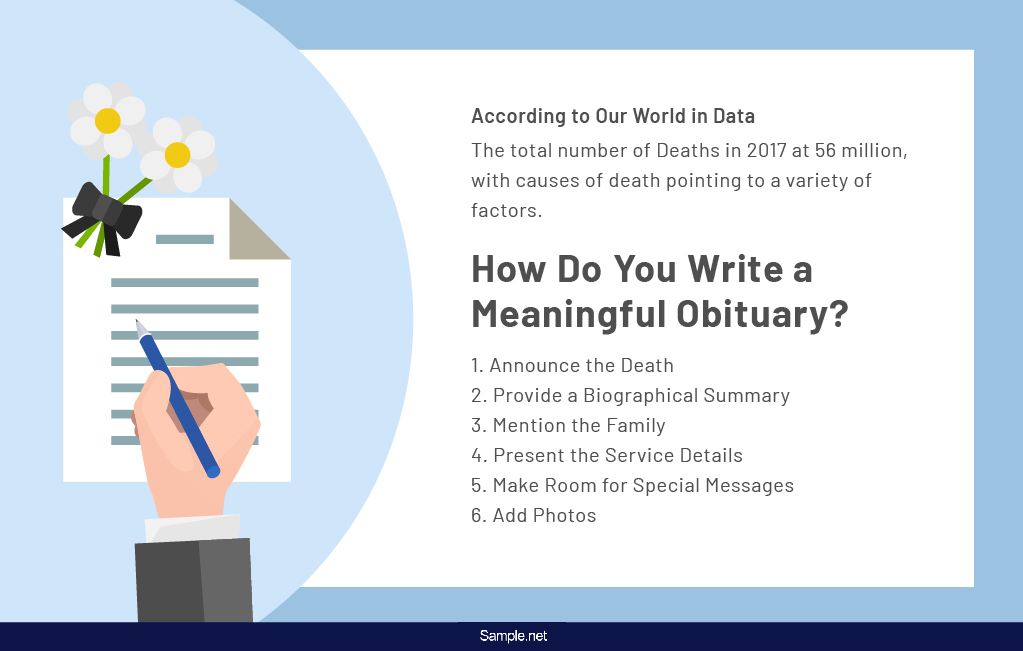
Obituary Mistakes to Avoid
It’s common for one to encounter pitfalls when writing an obituary. That’s because those writing the obituary may have a feeling of sorrow when writing an obituary for someone they know or sympathy for the family and friends of the deceased. In such circumstances, mistakes happen, and it becomes difficult for you to write an obituary that centers on the announcement of death and the celebration of life. Also, those with little to no experience in writing obituaries may not know where to start.
Now that we’ve discussed the fundamentals in obituary writing, it’s time we have a look at some common mistakes you’ll want to avoid. You can also see more on Living Will.
FAQS
Where are obituaries usually published?
Obituaries are commonly published in newspapers, online platforms, and sometimes shared on social media or funeral home websites. They can be both in print and digital forms, allowing friends and family to access them widely. You can also see more on Sample Will.
How long should an obituary be?
The length of an obituary varies. Traditional obituaries in newspapers may be concise due to space limitations, while online obituaries can be longer, including more personal stories and memories. Most obituaries range from 100 to 400 words.
What should be included in an obituary for a complete tribute?
A complete obituary includes the deceased’s full name, birth and death dates, significant life events, family members, achievements, hobbies, and personal values. Information about funeral services and any special requests from the family, such as charitable donations, can also be added to create a comprehensive tribute. You can also see more on Notice To Quit.
How do I choose the tone and style of an obituary?
The tone of an obituary should reflect the personality and character of the deceased. For formal or traditional styles, a respectful, concise tone is suitable. For a more personal or modern tribute, include anecdotes, humor, or unique memories, showing the individuality of the person.
How do online obituaries differ from traditional ones?
Online obituaries offer more flexibility, allowing for additional photos, videos, and comments from loved ones. Unlike print, there are fewer word limits, allowing for a more extensive life story. They also enable friends and family to share and interact with the tribute, creating a virtual memorial space. You can also see more on School Notice.